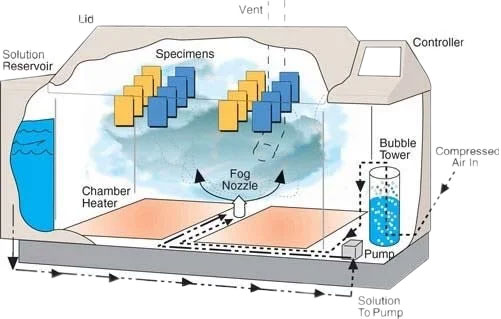Salt Spray Test
Salt spray corrosion is one of the most common and damaging forms of atmospheric corrosion, occurring naturally when chloride ions penetrate the protective and oxide layers on metal surfaces. These ions trigger electrochemical reactions with the underlying metal, leading to surface degradation and compromising the material's properties. Over time, this can cause further contamination and damage to finished products through pores and cracks.
To assess the corrosion resistance of materials or metal components, a salt spray test is employed. This environmental test simulates real-world salt spray conditions, allowing you to evaluate whether a particular fastener or material coating is durable enough to meet your specific requirements based on the test results.

We provide a range of corrosion testing methods, including:
- Neutral Salt Spray Test (NSS): Used for metal coatings and anodizing films, this is the most common accelerated corrosion test. A 5% NaCl solution with a pH of 6.5–7.2 is sprayed onto samples, with corrosion assessed after exposure.
- Acetate Salt Spray Test (ASS): Similar to NSS, but with glacial acetic acid added to lower the pH to around 3, accelerating corrosion, particularly for aluminum and decorative coatings.
- Copper Accelerated Acetic Acid Salt Spray Test (CASS): An enhanced version of ASS with copper ions added, used for copper-nickel-chrome coatings, increasing the corrosion rate by about eight times compared to NSS.
- Alternating Salt Spray Test: A comprehensive test combining salt spray with damp-heat cycles, used for products with organic coatings or anodizing layers, assessing corrosion both inside and out.
